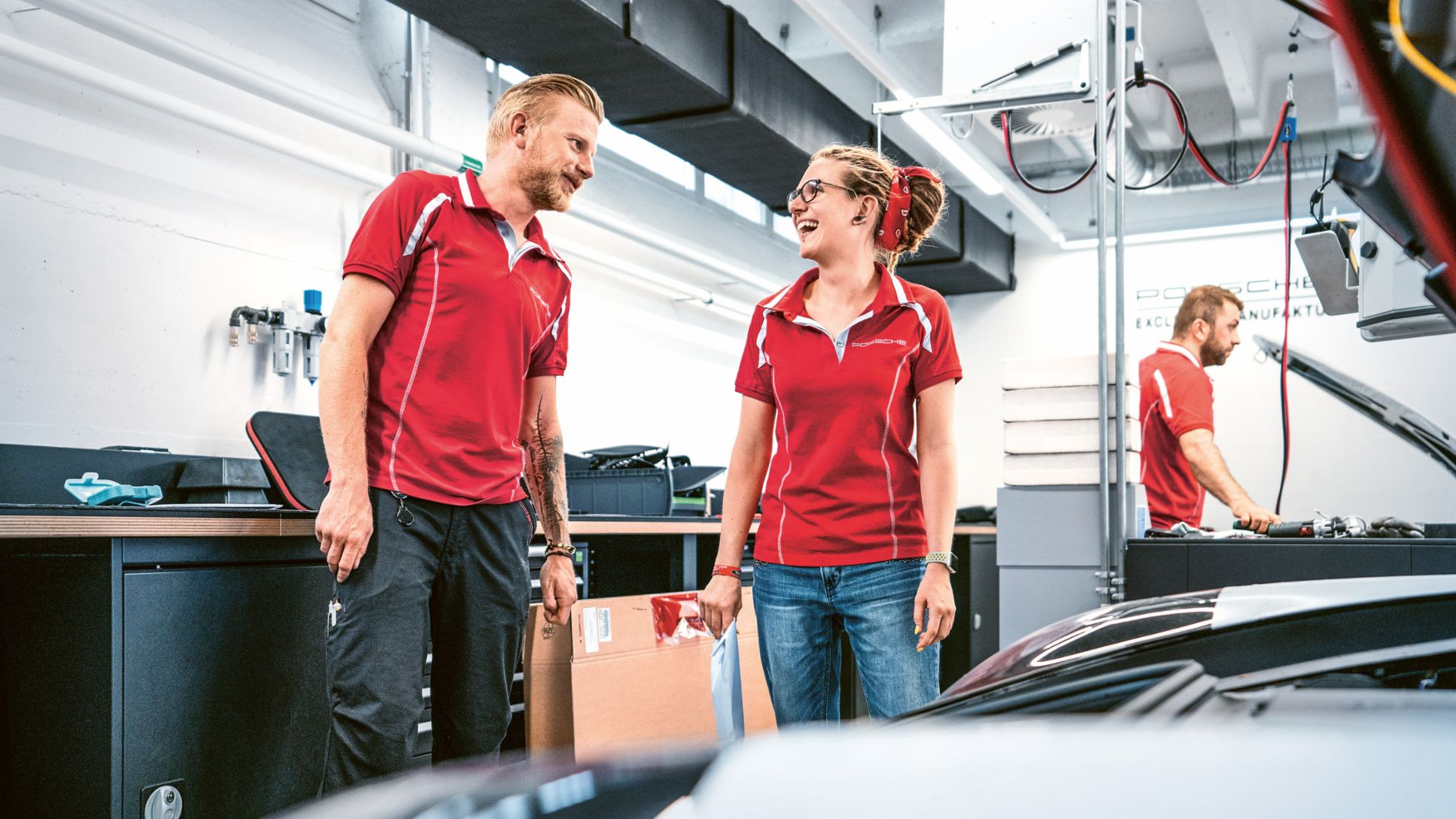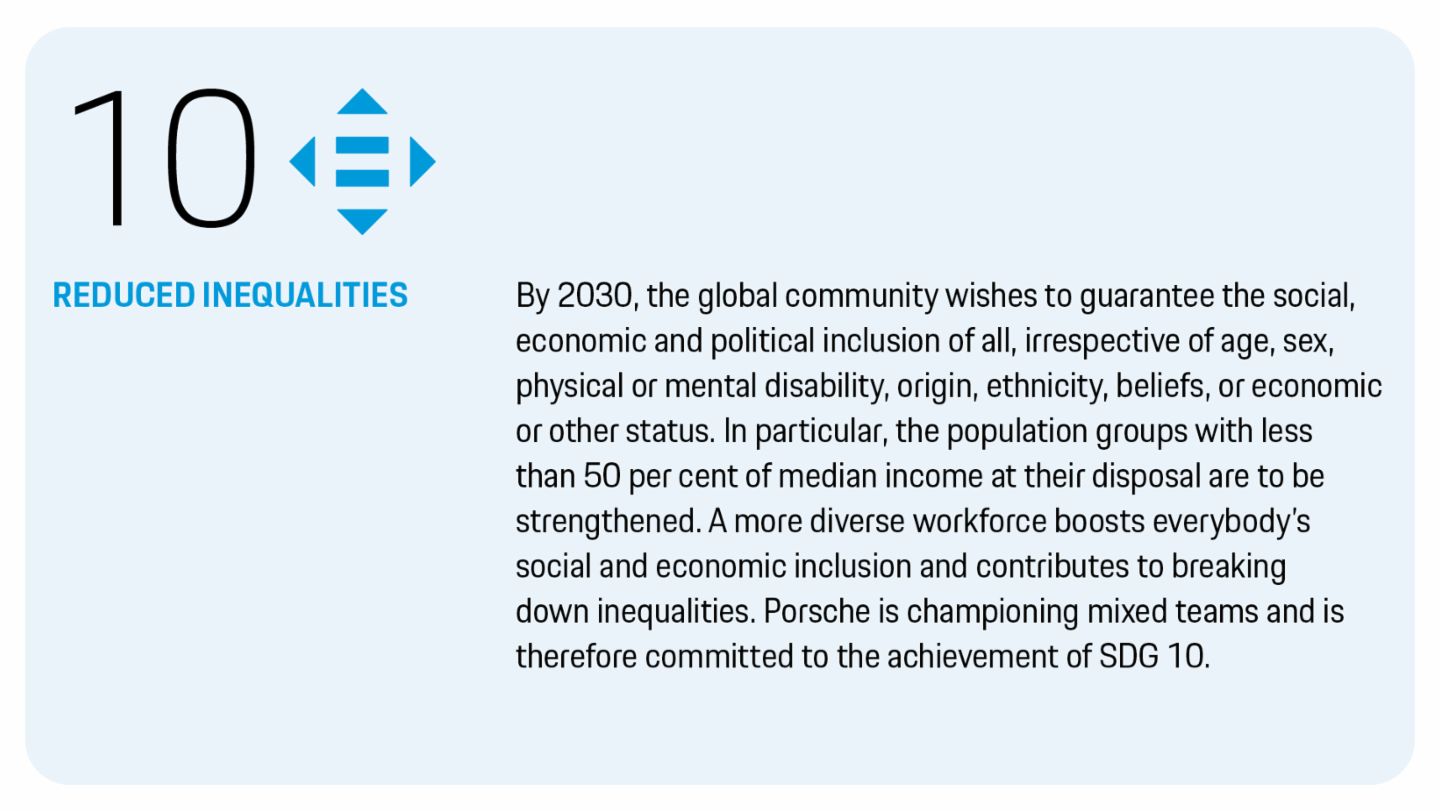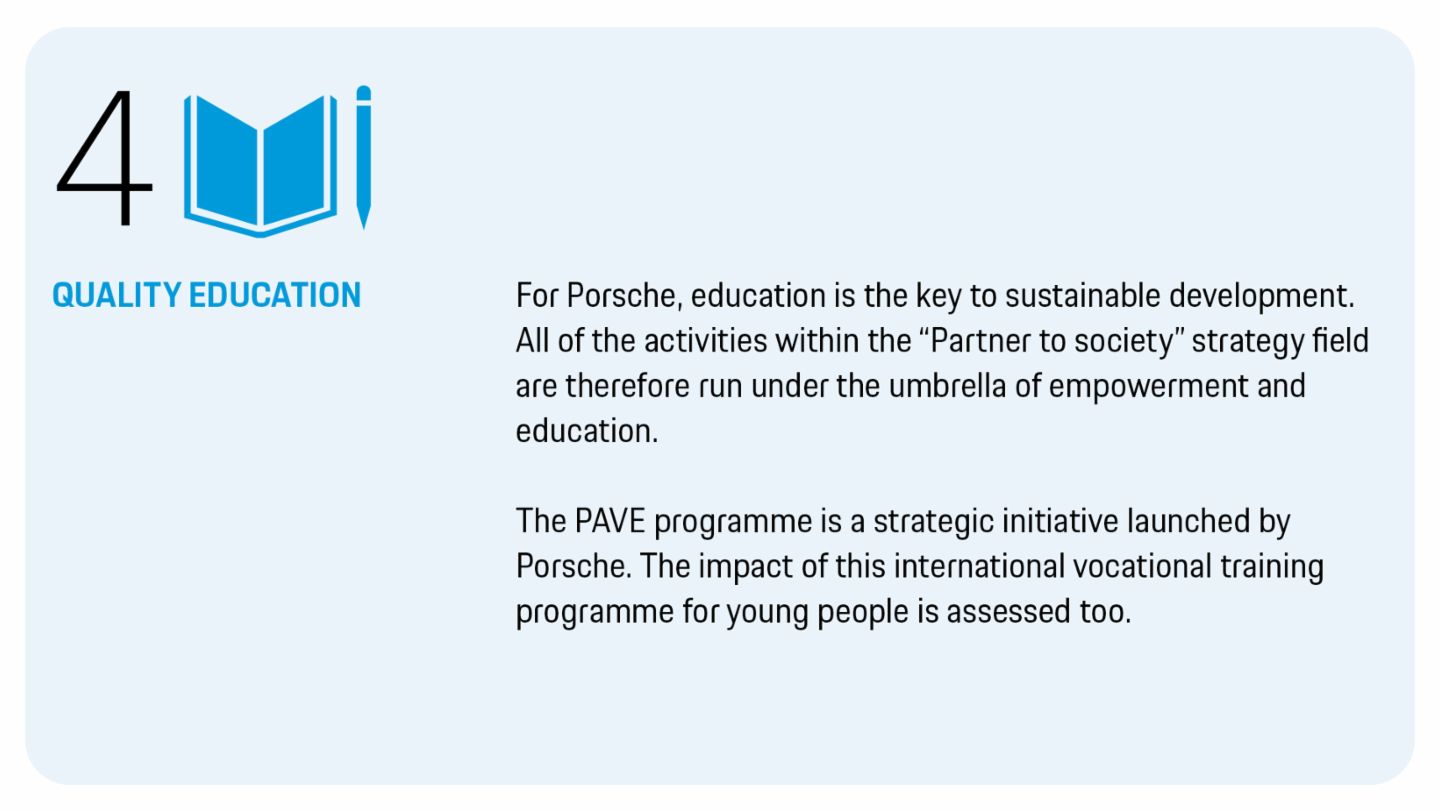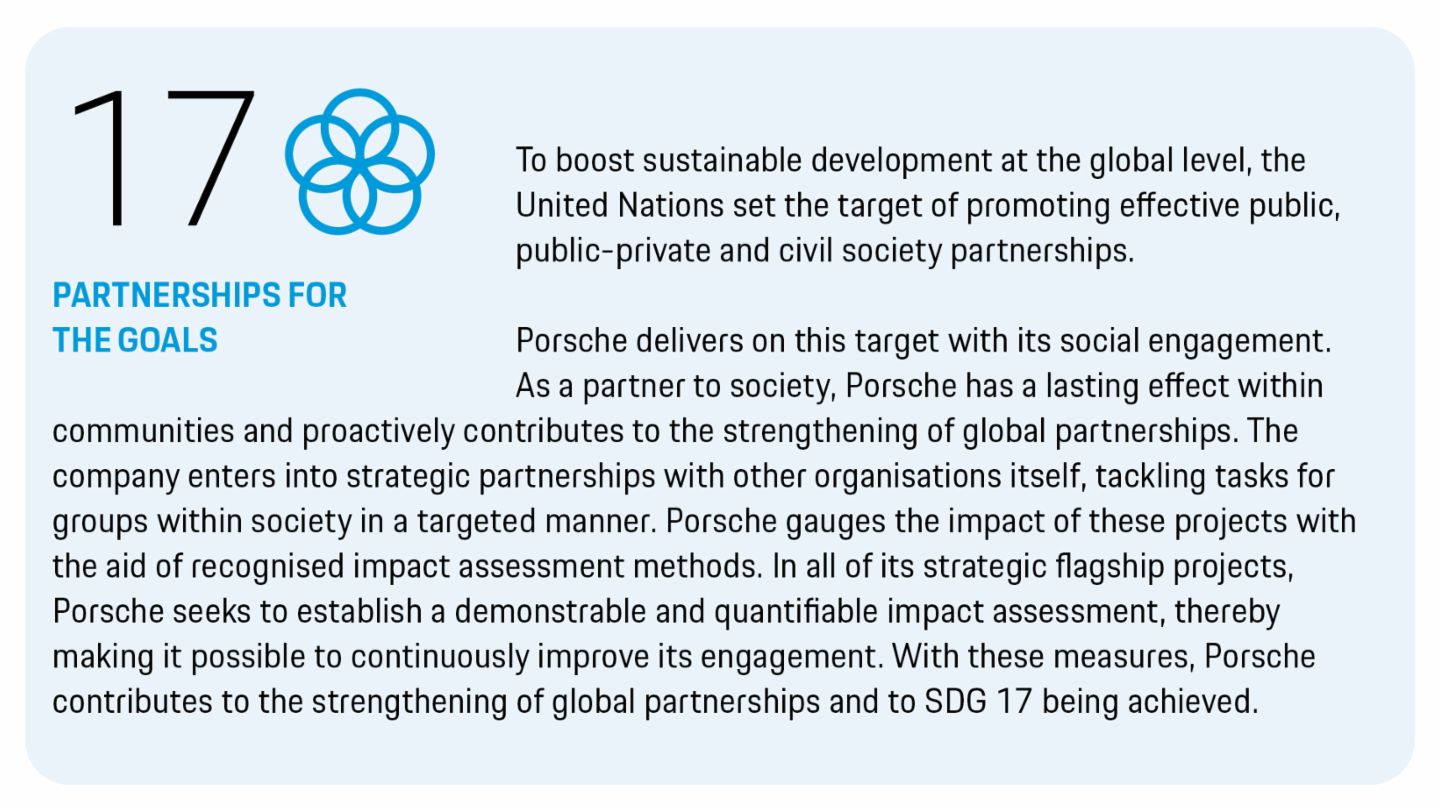At Porsche, the focus is on people. Each and every employee contributes to the success of the company with their unique skills. Porsche promotes diversity and guarantees equal opportunity.
Porsche would be nothing without the people who build it up and shape it. Porsche therefore focuses on people. Each and every employee contributes to the success of the company with their unique skills. Porsche promotes diversity and equal opportunity.
Both of these are prioritised in the sustainability strategy. This focuses on the topics of the advancement of women and international diversity, with intergenerational collaboration and the LGBTIQ community also being strengthened. At the same time, people with disabilities are proactively incorporated. In this way, Porsche promotes a work environment which is open, offers equal opportunity and encourages everyone. The strategic objective is the introduction of mixed teams in which the different strengths and skills of all the employees optimally complement one another, allowing them to realise their potential as best they can.
Diversity and Equal Opportunity
Porsche is pursuing the goal of establishing an inclusive culture, promoting diversity of views and appreciating people’s differences.
Porsche actively champions diversity and inclusion in the workforce. The premium manufacturer wishes to create an environment which promotes each and every person’s individuality in the interests of the company. Porsche firmly believes that diversity of views drives innovation and therefore represents a key success factor. Active diversity management creates new ideas, a better understanding of the market and greater employer attractiveness.
Significance for stakeholders and society
With this orientation, Porsche wishes to serve as a role model in the social context. The company therefore promotes diversity and inclusion outside of the factory gates too. Its activities here include social support projects and finding voluntary placements for employees. Voluntary engagement serves society and broadens the helpers’ horizons.
Diversity as a corporate principle
Safeguarding and promoting diversity and equal opportunity are highly important to Porsche and are enshrined as corporate principles. It is a matter of course for Porsche to offer all the employees the same opportunities. The company rejects all forms of discrimination. Porsche is pursuing the goal of establishing an inclusive culture, promoting diversity of views and appreciating people’s differences. This enables the employees to contribute their personalities and develop their personal potential, which encourages appreciative and tolerant interaction and taking a positive approach to different perspectives. This is all geared towards the achievement of a high level of productivity, competitiveness, innovative capacity, creativity and efficiency. The employees’ sense of belonging and communal spirit are to be bolstered at the same time. This is likewise enshrined in the Porsche family’s cultural self-image.
By adding their signature to the Charta der Vielfalt (Diversity Charter) in 2019, the Executive Board and Works Council set out in writing their commitment to diversity as part of the corporate culture. The Diversity and Equal Opportunity department is responsible for the long-term implementation and safeguarding of equal opportunity and diversity. This is based within the Learning, Corporate Culture and Change division as a source of input and an expert partner.
Porsche has set itself the goal of increasing diversity within the company by 2030. For example, the premium manufacturer wishes to establish a quantifiable number of mixed teams throughout the organisation. The basis for this is the strengthening of a mindset among all employees that is conducive to diversity. This involves creating an awareness of the positive effects of and the complexity of diversity.
Porsche has set itself the goal of increasing diversity within the company by 2030. For example, the premium manufacturer wishes to establish a quantifiable number of mixed teams throughout the organisation. The basis for this is the strengthening of a mindset among all employees that is conducive to diversity. This involves creating an awareness of the positive effects of and the complexity of diversity. At the same time, a corporate culture is to be established which perceives the employees’ differences as an advantage and a competitive factor for the company – regardless of gender, nationality, ethnic origin, religion, disability, age, sexual orientation or identity.
Porsche has a whistle-blower system in place via which possible violations of equal opportunity and equal treatment can be reported. Possible violations of the rules are followed up by this system, taking into account data protection, labour law and co-determination requirements. If violations are identified, action is taken accordingly.
In addition, a company complaints desk has been set up at Porsche, to which employees can turn in the event of discrimination or to which they can submit a complaint for review.
Porsche wishes to significantly increase the proportion of women in management positions by 2025.
Targeted promotion of diversity
As a matter of principle, Porsche selects, hires and promotes its employees according to their qualifications and skills. Based on the gender quota required by law, the sports car manufacturer has set itself the target of increasing the proportion of women in management positions by 2025. The proportion of women at the first and second management levels below the Executive Board are to be increased to 20 per cent and 18 per cent respectively.
To achieve this, all managers are required to increase the proportion of women at all management levels as well as in the pool of young employees. Likewise to make gender diversity quantifiable at Porsche, the company participated in the Women Career Index (FKi), a management tool for the advancement of women in business, for the second consecutive year. Porsche was ranked second overall and was also named Newcomer of the Year.
Porsche ranked second in the Women Career Index and named Newcomer of the Year.
Managers have a key role to play in raising awareness of the importance and added value of equal opportunity and diversity in management and the workforce more generally. Within the Volkswagen Group programme Together for Integrity, the managers’ awareness of equal opportunity and diversity is continuously raised in the Porsche Leadership Labs. A digital “diversity toolbox” assists them in their day-to-day work and management roles and provides an overview of the relevant performance indicators. The toolbox features a large number of different measures, tools and ideas which enable managers and their teams to make diversity of views experienceable in all its dimensions and question traditional patterns of thinking and behaviour. The majority of the training and event formats were switched to digital media in 2020 as a consequence of the coronavirus crisis. Other virtual and hybrid formats were added in the year under review, including the Diversity Days, which were held for the fifth time, and initiatives in relation to this year’s International Women’s Day.
Dialogue and exchange
Key elements here in the year under review were interaction, discussion, intensive dialogue and exchange within the Porsche workforce. An International Diversity Community was founded as a means of extensively promoting diversity. This is a forum which brings together all the Porsche subsidiaries around the world and their respective diversity managers. The community has a shared fundamental understanding of diversity. Its purpose is to strengthen the global perspective of diversity and equal opportunity as an area of action within Strategy 2030. It is provided with tools and ideas for the concrete implementation of diversity of views in the Porsche markets, enabling them to learn from one another on the basis of dialogue and exchange.
Porsche’s international women’s network likewise serves as an important platform for knowledge exchange across the various departments. The network now has more than 1,000 members. As a source of input for product development from a female perspective, it offers a variety of dialogue formats and informal support such as case advice offered by co-workers. In addition to the women’s network, the Proud@Porsche Community is an integral part of the Porsche culture too. Proud@Porsche is an internal LGBTIQ network which serves the employees as a platform for networking and regular exchange. Other exchange formats include Porsche Mentoring, which was expanded in 2021, the Diversity Strategy Talks and the dialogue conducted within Porsche’s Strategy 2030 or at the Sustainability Festival.
Attractiveness as an Employer
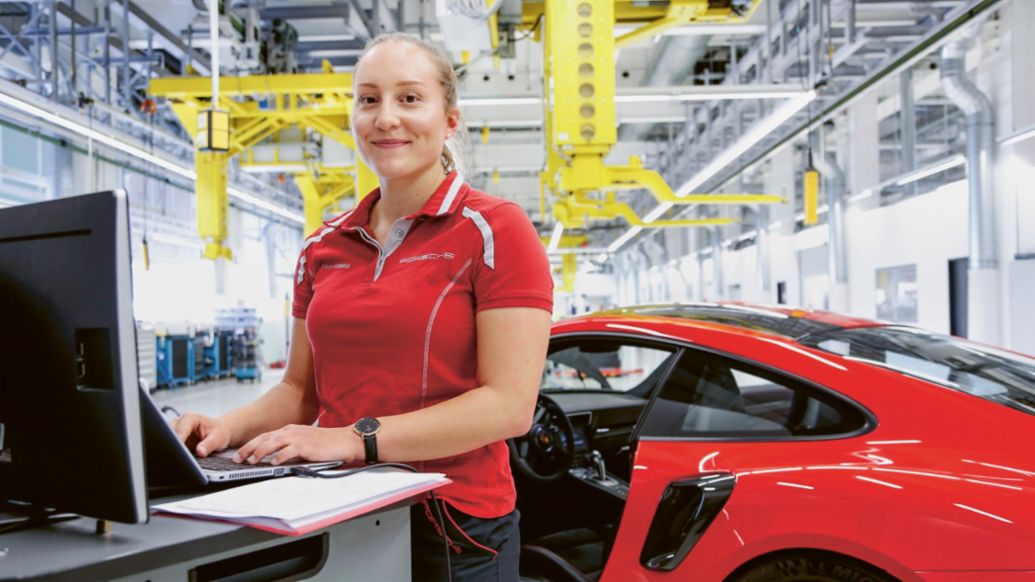
Porsche sees a strong corporate culture as a key foundation. It serves to rise to strategic challenges and enable the company’s successful transformation. The Porsche Code offers long-term guidance here as well as a target vision for the employees and managers.
Employees are one of the four key target groups in Porsche’s overarching Strategy 2030 alongside the customers, society and investors. Porsche’s primary goal in this area is to remain an attractive and reliable employer. What this first and foremost means for the sports car manufacturer is consistently focusing on the workforce and assuming responsibility as an employer. Being an attractive employer is therefore a core aspect of its HR strategy.
Porsche’s corporate culture
Porsche sees a strong corporate culture as a key foundation. It serves to rise to strategic challenges and enable the company’s successful transformation. The Porsche Code offers long-term guidance here as well as a target vision for the employees and managers. It allows them to actively co-determine the ongoing further development of the Porsche culture and contribute to ongoing improvement.
One of the central goals of Strategy 2030 is to be an attractive and reliable employer. For Porsche, this above all means keeping the promises it makes its employees and turning them into a tangible reality in everyday working life. Talented individuals in the labour market should perceive Porsche as a top employer. This is dependent on it having a high degree of credibility. This is the only way Porsche can attract the most qualified staff and retain them in the long term. The company wishes to recruit experienced and creative IT and digitalisation experts in the fields of the future and is continuously stepping up its efforts here.
Porsche is looking for new employees who will actively help shape the future of mobility and thus drive social change. The company has taken various steps to this end, such as the Sustainable Career employer branding campaign and partnerships with relevant universities and organisations, including its collaboration with Formula Student Germany and the programming schools 42 in Wolfsburg and Heilbronn. With this special engagement, Porsche secures talented young individuals to whom it is especially important that their work has more meaning than merely financial incentive.
Work-life balance
Porsche strives to ensure that its staff can achieve a work-life balance. Employees receive support from a wide variety of different measures and options. For example, local cooperation partners ensure that regular childcare places are available in nurseries close to the company’s sites. Furthermore, in emergencies, additional childcare places are available at day care centres in Stuttgart. Parents can also take their children to work for a few hours.
In summer, the children of employees can attend a school holiday programme that runs throughout the holidays. Through its family service, Porsche offers extensive, free and individually tailored advice and support on all aspects of family life, in particular for parents-to-be and in the area of care for the elderly.
More than 130,000 applications in response to over 3,800 advertised vacancies.
Porsche takes account of its employees’ individual needs and promotes flexible working options with regard to workplace and working hours, giving them a high degree of flexibility regarding their personal circumstances. This flexibility was further enhanced in 2021 with the amended works agreement regarding mobile working, which allows up to 12 full days of mobile working per calendar month. Mobile working by the hour also remains an option. An exceptional rule was applied in the year under review due to the coronavirus crisis, with the permitted time for working hours being extended and with interns and trainees being incorporated too. Porsche employees are free to decide where and, to a certain extent, when they perform their work if their role can be carried out remotely.
Further options range from flexible working hours aligned to the employee’s current phase of life through to care leave to support family members. Employees may also take sabbaticals and have the option of working part-time. Many employees decide to take parental leave. Porsche then helps these individuals make a smooth return to work, arranging further qualifications for them during their absence that will simplify the process of returning to work.
Porsche’s high level of attractiveness as an employer is demonstrated by the number of applicants, which remains high – in 2021, the Porsche Group received more than 130,000 applications in response to over 3,800 advertised vacancies. Once again during the year under review, the sports car manufacturer was ranked as a top employer by students in verified employer rankings. In the Universum Student Survey, Porsche was again named the most attractive employer for engineers in 2021.
The company’s top rankings in the previous year among the target groups of engineers and economists were likewise confirmed once again. In the Trendence Institute’s annual student survey, Porsche improved its scores across all the target groups (engineering, economics and business administration, and IT/computer science). In the weighted overall ranking comprising all areas, Porsche was ranked second by the target group of young professionals. In the Universum Young Professionals Survey, the company defended its previous year’s top spot, taking first place once again in the area of engineering and knocking Google off the top spot in economics and business administration. And last, but not least, Porsche was again voted the most attractive employer in the automotive industry in a study conducted among students and future graduates by Automobilwoche and the Institute of the Automotive Industry (IfA). The company therefore reaped the Automotive TopCareer Award again in 2021, as it did in 2020.
The mood index came in at 79.1 out of 100 index points.
Measuring employee satisfaction
It is very important to Porsche that its employees are actively involved in processes and that their opinions, views and suggestions are all listened to. The company gauges the satisfaction levels among its employees with the mood barometer. This annual employee survey also determines the company’s attractiveness as an employer internally. The sports car manufacturer is additionally interested in the employees’ views regarding the company’s integrity and its collaboration with the Volkswagen Group. The results of the mood barometer are used to identify potential areas for improvement and provide managers with information on areas requiring attention in their organisational units. In fixed follow-up processes, the managers and their employees jointly define suitable measures with the support of the team responsible for the mood barometer, which has various tools at its disposal. The aim is to secure the long-term implementation of the derived measures in the organisational units. More than 16,000 Porsche employees participated in the 2021 mood barometer survey, which corresponds to a participation rate of 74 per cent. The mood index, one of the mood barometer’s primary metrics, came in at 79.1 out of a possible 100 index points in the year under review, thus confirming the previous year’s level.
Employee development and socially ethical Transformation
The importance of new online training increased in the year under review. Working and learning during the pandemic and the transformation advancements necessitate key skills and new professional abilities.
Many of the training and professional development sessions were held virtually in 2020. The significance of new content offerings with regard to how the “new normal” is handled therefore increased in the year under review. Working and learning during the pandemic and the transformation advancements necessitate key skills and new professional abilities. These were jointly developed by HR and the departments.
Mindfulness and hybrid management
Working flexibly, be it in the office or from home, calls for an array of options to be offered to the employees and managers accordingly. The objective is to ensure that “hybrid” collaboration within a team goes smoothly and that the new ways of working are given the best possible design. For example, the simulation of practical examples in the “Managing hybrid teams” training course allowed decisions, the team’s reaction to these and their work results to be addressed in an entertaining and fun way.
It is also important that every member of a team maintains or improves their own achievement potential. Here too, virtual workshops and tricks were developed which allow for self-assessment and which provide concrete tips regarding how to be more mindful of oneself and others in day-to-day work.
The topic of mindfulness is in great demand. In view of this, a podcast entitled “Brennen statt Ausbrennen” (meaning “Fired up, not burnt out”) was created in the year under review, based on the content of the “Promoting self-management skills” training course. Comprising five episodes, the podcast addresses various aspects of mindfulness, resilience and work-life balance, and teaches practical exercises for use in day-to-day work.

The importance of new online training increased in the year under review. Working and learning during the pandemic and the transformation advancements necessitate key skills and new professional abilities.
Digital learning
The podcast is made available centrally via the Porsche podcast app, which is offered exclusively to the employees. It serves as a central platform for numerous internal podcasts from various business divisions. The podcast app therefore expands the array of digital services by another important building block and promotes needs-based learning which is flexible in terms of time and location.
Overall, what’s known as the Porsche learning ecosystem was expanded by a large number of innovative and user-centric tools and formats in the year under review. For example, the 360° Feedback app was used during the Porsche Leadership Labs once again and was further professionalised. Online simulations were also used in the areas of change management and hybrid management. This involved the potential of VR headsets to assist with presentation training being evaluated. At the heart of these activities is the goal of creating a unique learning experience which usefully integrates the formats, tools and offerings, thereby supporting the employees in self-managed, social and also trainer-based learning.
From Fit for Digit@l to the Digital Academy
The Fit for Digit@l knowledge initiative has reached more than 5,000 employees throughout the company in recent years and has familiarised them with digital transformation. In a variety of formats and offerings, the digital world is made tangible and the company’s digitalisation strategy is communicated. To date, primarily beginners’ knowledge has been taught in the more than 170 hours of mainly digital learning opportunities. This year, however, the array of professional training with a higher level of specialisation was also significantly expanded. The Porsche Digital Academy is neither an academic institution, nor a purely online service. Rather, it sees itself as an umbrella operation for all of Porsche’s qualification opportunities relating to digital skills. In collaboration with internal and external experts, the Learning, Corporate Culture and Change main department provides cross-departmental qualification options that allow employees to expand their digital skills. It is therefore an important element of what’s known as Porsche Workforce Transformation, with which Porsche is seeking to successfully develop and implement new technologies and business fields. The portfolio ranges from coding base camps and hybrid training modules to “nanodegrees” and certification courses given by recognised specialists and universities. In the year under review, up to 1,500 participants were assisted in building up their professional skills in the areas of software development, AI and data, IT architecture, cloud computing, digital security and agile work methods.

Gradual return to face-to-face teaching
After 2020 having been very much dominated by virtualisation of the qualification portfolio, an increasing number of face-to-face training modules was offered in the year under review. With the inauguration of Schlossgut Harteneck as a new campus, a new, innovative training site for management qualifications was established. This boasts a learner-centred environment where no two rooms are alike. The unique design and layout of the training space meets with positive feedback across the board from the participants and the trainers. The Learning Campus inaugurated in Stuttgart-Zuffenhausen in autumn has likewise met with positive feedback. This new training space is used for the qualification of employees and caters to the increasing expectations of an interactive approach to modern qualification. The room configuration allows for flexible use and also facilitates a hybrid training setting.
Start of the new management programme
Porsche introduced a new management programme in the year under review based on the revised requirements for the assumption of management functions. It is aimed at employees taking on a management function for the first time. They are offered intensive support in their new roles as disciplinary or functional managers in the form of perfectly tailored qualification measures. The programme focuses on three key areas – strengthening the management role faced with the conflicting priorities of operational versus innovative tasks, managing in-person, hybrid and virtual teams, and moulding one’s own scope for action to create value.
Survey in the context of Strategy 2030
Porsche’s success is founded on the performance of its employees, who apply their skills and knowledge to the company. For this to be the case, it is important that needs-based development opportunities continue to be offered in the future too.
How are the current development paths received? What expectations do the employees have regarding their development at Porsche? The sports car manufacturer obtained answers to these questions in a representative employee survey conducted in October 2021.
The employees were selected at random from among the entire workforce. Over 60 per cent of them participated. The results offer a new angle on a career at Porsche. They are used to derive measures on the topic of HR development and to elaborate development paths for what’s known as Porsche Workforce Transformation within Porsche’s Strategy 2030.
Measuring effectiveness
The feedback form developed in 2020 assesses all of Porsche’s qualification measures. It was implemented at the beginning of the year under review. A new aspect of the form is that it does not only record learning outcome directly upon the conclusion of training – it also records the employees’ opinions 90 days later. An assessment can then be made regarding how what they learned is being applied in their day-to-day work. The sports car manufacturer also defined other performance indicators that shed light on the contribution made by the interdisciplinary qualification portfolio. Designed to boost the effectiveness of the measures, these are summarised and clearly illustrated. The half-yearly evaluation is made available both to those responsible for the products and to management representatives. The intention is to improve the participants’ satisfaction with the interdisciplinary qualification measures and continuously improve the processes.
